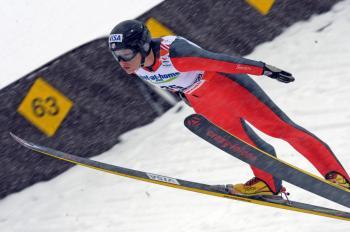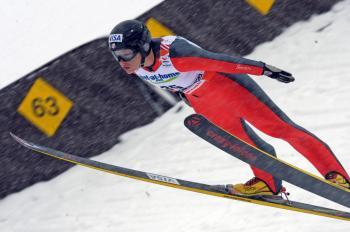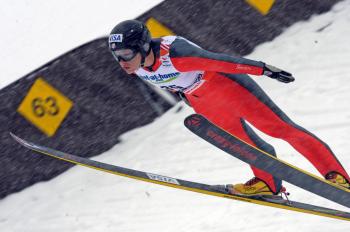The critical issue is whether the Canadian Charter of Rights and Freedoms applies to the Vancouver 2010 Organizing Committee (VANOC), said Nina Hooper-Reid, a lawyer whose 15-year-old daughter, Megan Reid, is one of the 15 plaintiffs from five countries in the landmark discrimination case.
Ms. Hooper-Reid attended the five-day trial last week in Vancouver before British Columbia Supreme Court Justice Lauri Ann Fenlon.
“We’re all quite cautiously optimistic,” she told The Epoch Times. “The court case is seeking a declaration that it is contrary to the charter for VANOC to host a men’s event and not host a women’s event as well.”
The plaintiffs are asking the court to grant a declaration that if VANOC plans, organizes, finances, and stages ski jumping events for men, then failure to do the same for a women’s ski jumping event violates women’s equality rights guaranteed in Section 15 of the charter.
Their lawyer, Ross Clark, argues that VANOC’s governance, finances, and other activities are controlled by various levels of the Canadian government—including the federal and provincial governments and the municipal governments of Vancouver and Whistler—and it is therefore subject to the charter.
Defence lawyer George Macintosh argued that VANOC is controlled by the International Olympic Committee (IOC), a “foreign, non-governmental entity” that is not bound by the charter.
The committee also argued that only the IOC can include an event in the Olympic Games and VANOC has no right or power to do so.
However, it was the IOC that originally voted to bar women’s ski jumping in November 2006 when it was deciding on which events to add to the 2010 Games.
At the time, the International Ski Federation, among the international non-governmental sports organizations recognized by the IOC, voted overwhelmingly in favour of including women’s ski jumping.
But the IOC excluded the sport based on “technical merit.”
Among other arguments, it said female ski jumping had not reached a high enough technical standard or level of development, and that there were not enough qualified women in the sport worldwide.
It also maintained that a sport must have held two world championships to be included. Women’s ski jumping only held its first world championship this past February, in Liberec, Czech Republic.
Ski Jumping Canada (SJC), the sport’s national governing body in Canada, is among those who disagree with the IOC.
In no other sport are the women’s and men’s events compared, said SJC chairman Brent Morrice. He said the women “can jump right down to the critical point in any hill that they’ve competed on…saying that they’re not capable—it’s uninformed. These girls are ready to compete.”
Margot Young, associate professor at University of British Columbia’s Faculty of Law, noted that “women’s ski jumping is as well developed now as men’s ski jumping was when it was admitted to the Olympics.”
“It’s hard to get a certain level of development without having your sport being admitted on the Olympics schedule,” she said.
Ms. Young also noted that “women’s ski jumping has equivalent numbers of elite participants and representation of countries by those elite participants as some other sports already in the Olympics.”
Ski cross was recently admitted into the Olympics but is a less developed sport than women’s ski jumping, she said.
Ski cross was admitted based on an Olympic gender-equality policy stipulating that any new event added since 1991 must include competition for both men and women. Unfortunately, the policy does not apply to ski jumping since it has been an Olympic sport since the Winter Games began in 1924.
“They immediately included women’s ski cross in the Olympics and didn’t say they had to have two world championships,” said Mr. Morrice.
He hopes “the Canadian court makes the right decision and then after that the IOC makes the right decision” and “will be gracious to host and include the event.”
All the male ski jumpers in Canada support the inclusion of the female ski jumpers in the Olympics, he said. “They know it’s good for the sport. In every other sport where they decided to finally include women, it has been nothing but good for the sport in the long run for both men and women.”
“The sport has struggled for years to get into the Olympics. They’ve reached the point now where it’s certainly sustainable and it needs to be in the Olympics for the sport to continue to grow,” said Ms. Hooper-Reid.
Mr. Morrice said “it’s just wrong” for the IOC to exclude women’s ski jumping. “It fits all the criteria…. That’s why the Canadian court system decided that they had a viable case to argue.”
“What’s really rewarding with the court case was to see the women’s claim recognized and legitimized through the process,” Ms. Hooper-Reid said.
Female Ski Jumpers Seek Olympic Inclusion
A multinational group of female ski jumpers who launched a lawsuit seeking to be included...

American Lindsey Van competes in the Ski Jump Ladies race at the Nordic World Championships February 20, 2009 in Liberec, Czech Republic, winning ahead of Germany’s Ulrike Grassler and Norway’s Anette Sagen. All three are plaintiffs in a lawsuit seeking inclusion of women ski jumpers in the Vancouver 2010 Winter Olympics. Janke Skarzynski/AFP/Getty Images
|Updated:
A multinational group of female ski jumpers who launched a lawsuit seeking to be included in the Vancouver 2010 Winter Olympics is “cautiously optimistic” about the outcome of their case.





